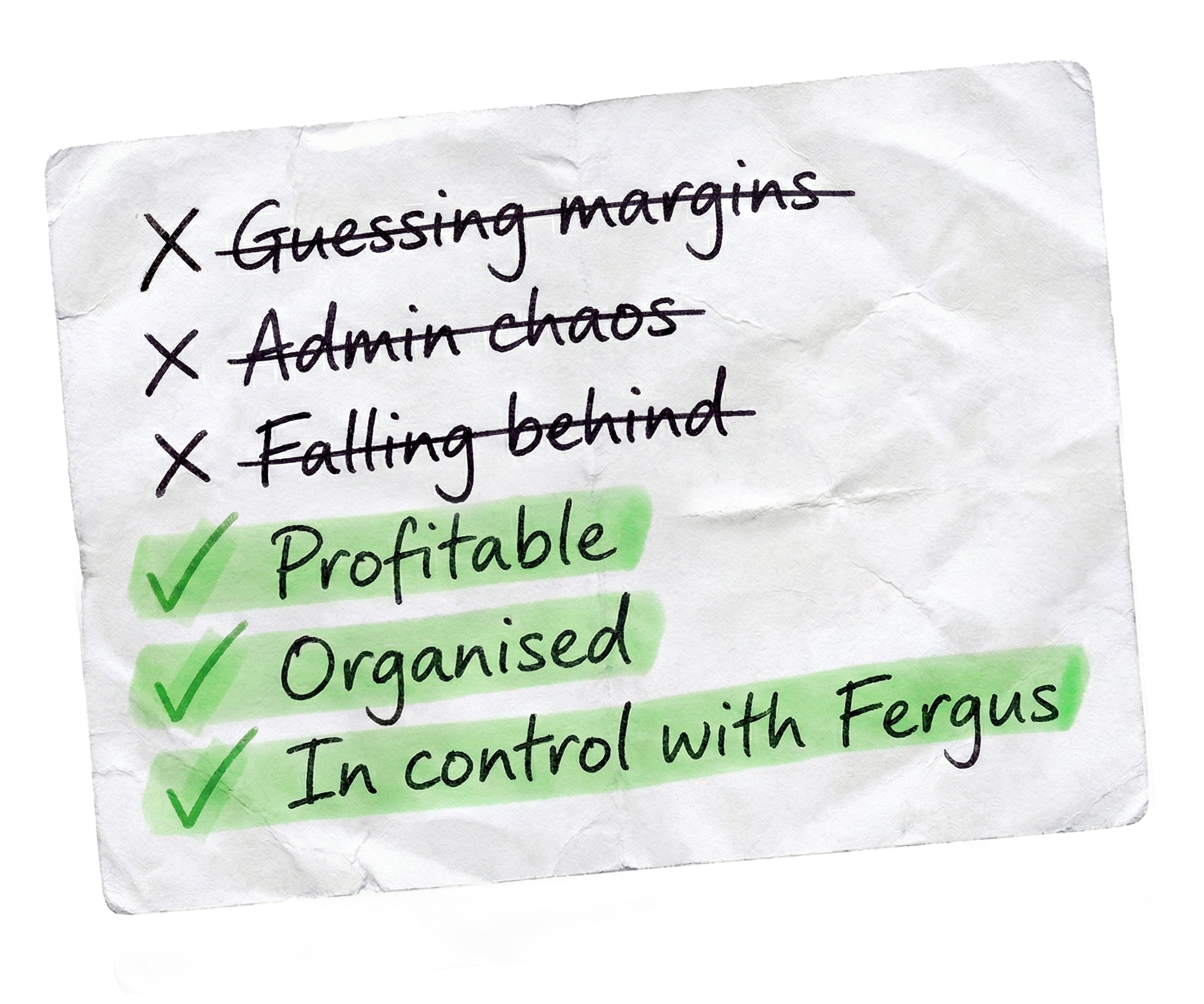
Running an electrical or plumbing business comes with a unique set of challenges, but growing your profits doesn’t have to be one of them. With the right strategies and tools, you can see significant improvements in your business in just 90 days. In this guide, we’ll break down actionable steps you can take to increase your profit margins and set your business on a course for sustainable growth.
Understanding how each job contributes to your bottom line is critical to improving profitability. While many business owners assume all jobs bring in similar profits, that’s not always the case. Some jobs may have unforeseen costs, underpriced services, or materials that aren’t billed properly, all of which can chip away at your margins.
By using a job management system like Fergus, you can track the profitability of every job in real-time. Fergus allows you to see how much you’re spending on materials, labor, and other expenses, and it integrates seamlessly with accounting systems like Xero and QuickBooks. With these insights, you’ll know which jobs are most profitable and which ones are eating into your profits, enabling you to focus on the most lucrative opportunities.
For example, you might find that smaller jobs, while easier to complete, are less profitable once you account for the time and materials involved. On the other hand, larger, more complex jobs could offer a better return on investment. By tracking job profitability with a tool like Fergus, you can prioritise the right kinds of jobs and set more accurate pricing to ensure a healthy profit margin.
Raising prices across the board can be risky, especially if your customers are sensitive to price changes. Instead, adopt a more strategic approach to pricing. Look for areas where you can add value or where your services are in high demand. Specializing in a niche area, such as emergency electrical repairs or high-end plumbing installations, allows you to charge premium rates without losing customers.
For instance, consider offering value-added services like maintenance packages, which can provide recurring revenue without requiring additional materials. These packages can be tailored to your clients’ needs, such as regular electrical safety checks or seasonal plumbing maintenance, helping to smooth out cash flow over time.
Additionally, if you offer emergency services, don’t be afraid to charge a premium for these jobs. Urgent repairs often come at inconvenient times, and customers are willing to pay more for immediate, reliable service. By offering premium pricing for high-demand services and carefully adjusting your rates, you can increase your profits without scaring away customers.
Material waste is one of the most common culprits behind shrinking profit margins. Every time you purchase materials for a job but fail to bill the customer for them, you’re essentially losing money. While this may happen accidentally from time to time, over the course of multiple jobs, these small oversights can add up to substantial losses.
By using a job management tool like Fergus, you can link materials directly to jobs, ensuring that everything you purchase is accounted for and charged to the appropriate client. Fergus makes it easy to track inventory and manage your material orders, preventing over-ordering or forgetting to bill for materials used. You can even set up automatic notifications to remind you when materials have been added to a job but not yet invoiced.
This level of control over your materials ensures you’re not wasting resources or leaving money on the table. And, as you streamline your material management, you’ll be able to more accurately estimate costs, which can also help with pricing and quoting.
Time is money, especially in the trades. Inefficiencies in your workflow—whether it’s wasted travel time, scheduling conflicts, or downtime between jobs—can significantly impact your bottom line. To grow your profits, you need to maximise the time your team spends on billable work.
One of the easiest ways to do this is by optimizing your scheduling. With a job management system like Fergus, you can automate job scheduling, assign tasks to team members based on their availability, and ensure that everyone knows where they need to be at all times. This reduces the likelihood of costly delays and allows your team to complete more jobs in a day.
Additionally, consider streamlining your communication processes. Miscommunication between team members or with clients can lead to mistakes, delays, and even lost jobs. Use tools like Fergus to centralise your job information, making it easier for everyone to access the latest updates, notes, and client requests. By having a clear, organised system in place, you’ll save time, avoid costly errors, and improve your overall efficiency.
Another way to boost your profits is by upselling or cross-selling services to your existing clients. When you’re already on-site completing a job, look for opportunities to offer additional services that the client may not have considered. For example, if you’re installing a new electrical panel, suggest adding surge protection or smart home upgrades. If you’re completing a plumbing repair, offer a water filtration system or a routine maintenance plan.
The key to successful upselling is to frame these additional services as value-added solutions that benefit the customer. You’re not just selling more for the sake of it—you’re helping the client by offering options that enhance safety, efficiency, or convenience.
Upselling and cross-selling don’t require additional marketing costs or lead generation efforts, making them a highly cost-effective way to increase revenue from each job.
It’s essential to stay on top of your finances if you want to grow your profits. Too many business owners only review their financials at tax time or when they run into cash flow problems, but this reactive approach won’t help you grow sustainably. Instead, make it a habit to review your financials on a regular basis—ideally monthly.
Fergus, integrated with accounting systems like Xero and QuickBooks, makes it easy to keep track of your income, expenses, and profit margins. By regularly reviewing this data, you’ll be able to identify trends, catch potential issues before they become major problems, and make informed decisions about where to cut costs or invest in growth.
By implementing these strategies—tracking job profitability, optimizing pricing, managing materials efficiently, improving operations, and upselling services—you can see a significant increase in your profits in as little as 90 days. The key is to stay proactive and use the right tools, like Fergus, to monitor and manage your business effectively. With Fergus, you can take control of your job management, streamline operations, and make smarter decisions that boost your bottom line.
Stop drowning in admin & paperwork. Start focusing on the jobs that make you money.



Our 20,000+ trades businesses have slashed their admin, are getting paid faster, and are finally enjoying their weekends again.






